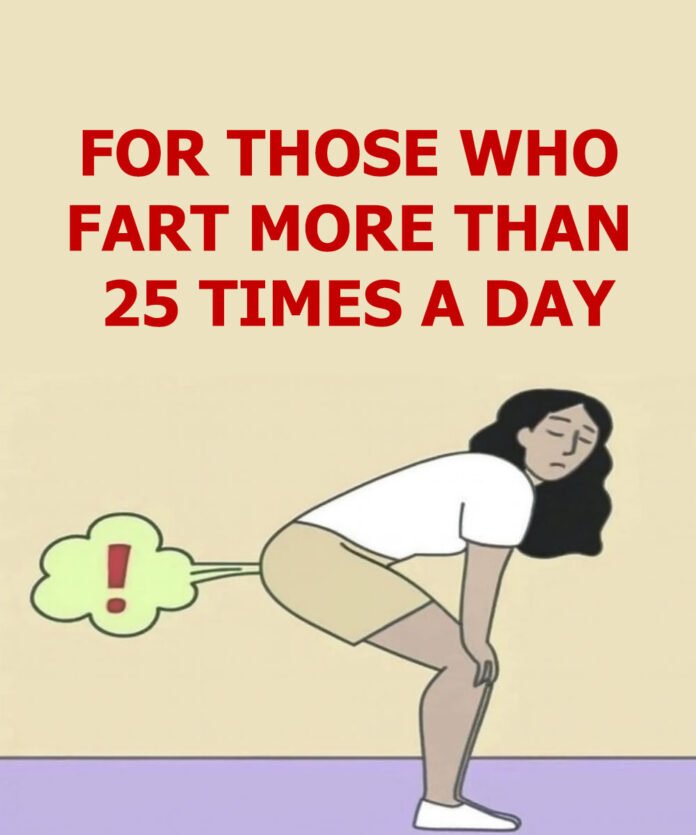It might not be a topic you bring up at the dinner table, but let’s be honest—we all pass gas. In fact, most people do it anywhere from 14 to 25 times a day, whether they realize it or not. But what if it’s happening more than that?
If you find yourself farting more than 25 times a day, and especially if it’s accompanied by other digestive symptoms, it might be more than just a quirk—it could be your body’s way of sounding an alarm.
Let’s break down what’s normal, what’s not, and what you can do about it.
What Is Farting, Really?
Flatulence, or farting, is the release of gas from your digestive tract, particularly the intestines and stomach, through the rectum. This gas is produced either by swallowed air or by bacteria breaking down food in your gut.
In most cases, it’s a harmless, natural function—just like breathing or blinking. But excessive flatulence might be a sign that your digestive system is out of balance.
When Does Farting Become “Too Much”?
Passing gas throughout the day is entirely normal. But if you’re hitting the high end—or exceeding it—and notice that your gas is persistent, painful, or smells particularly foul, your gut might be trying to tell you something.
Here’s what might be going on:
1. Your Diet Might Be the Culprit
Certain foods are notorious for causing excess gas. They can be healthy, but difficult for your body to digest fully, leading to fermentation in your gut—which creates gas.
High-fiber foods that commonly cause gas include:
- Beans and lentils
- Broccoli, cauliflower, cabbage
- Onions and garlic
- Whole grains
- Apples and pears
Other dietary causes:
- Carbonated drinks (soda, sparkling water)
- Sugar alcohols like sorbitol and mannitol (often found in sugar-free gum or candy)
- Lactose (for those with lactose intolerance)
- Fructose or high-fructose corn syrup (common in processed foods and juices)
If you’re farting more than 25 times a day, take a closer look at what’s on your plate.
2. You Might Be Swallowing Too Much Air
You could be filling your gut with air without even realizing it.
Common habits that lead to excess swallowed air (aerophagia):
- Chewing gum frequently
- Drinking through straws
- Eating or drinking too quickly
- Talking while eating
- Smoking
This swallowed air has to go somewhere—and eventually, it comes out.
3. You Could Have a Food Intolerance
Food intolerances are among the most common and overlooked reasons for excessive gas.
Some common culprits:
- Lactose intolerance – Trouble digesting milk sugar
- Gluten intolerance or Celiac disease – An immune reaction to gluten
- FODMAP sensitivity – A group of fermentable carbs found in many healthy foods
If certain meals seem to set off bloating, cramping, and gas, you might benefit from an elimination diet or a consultation with a digestive specialist.
4. Digestive Disorders That Cause Excess Gas
Sometimes, frequent farting is a sign of something more serious going on in your gut.
Medical conditions linked to excessive flatulence include:
- IBS (Irritable Bowel Syndrome) – Known for gas, bloating, and abdominal pain
- SIBO (Small Intestinal Bacterial Overgrowth) – Too many bacteria in the wrong part of the gut
- Celiac disease – Autoimmune condition triggered by gluten
- GERD (acid reflux) – Can cause frequent swallowing and air intake
- Pancreatic insufficiency – Poor digestion due to lack of digestive enzymes
These conditions can lead to incomplete digestion, causing food to ferment and produce gas.
5. Medications Could Be Behind the Bloating
Yes, your medication might be responsible for all that extra wind.
Common offenders:
- Antibiotics – They disrupt the balance of good bacteria in your gut
- Laxatives – Can stimulate rapid digestion
- Metformin – A common diabetes drug known for digestive side effects
- Fiber supplements – Often helpful but can produce a lot of gas at first
If you started a new medication and noticed a big change in your digestive habits, it’s worth mentioning to your doctor.
When Should You See a Doctor?
Excess gas on its own isn’t usually cause for alarm. But if you’re experiencing other symptoms alongside it, you shouldn’t ignore them.
See a healthcare provider if you have:
- Bloating or abdominal pain that doesn’t go away
- Diarrhea or constipation
- Unexplained weight loss
- Blood in your stool
- Fatigue or low energy
- Loss of appetite
- Recent dietary changes that worsen symptoms
These signs could point to a more serious digestive disorder that needs treatment.
How to Reduce Excessive Gas (Without Giving Up Your Favorite Foods)
If your gas is starting to interfere with your daily life, there are steps you can take to get things under control—without going on a starvation diet.
Keep a Food Diary
Track what you eat and how your body responds. This can help identify specific triggers and patterns, especially if you’re farting excessively after certain meals.
Try a Low-FODMAP Diet
FODMAPs are a group of carbohydrates that ferment in the gut and produce gas. Reducing them temporarily has helped many people with IBS find relief.
Work with a dietitian if you can—this plan can be complex.
Eat Slower and Chew Thoroughly
Eating quickly or distractedly can cause you to swallow more air, while also putting extra pressure on your digestive system. Mindful eating helps reduce both gas and bloating.
Probiotics
These supplements help balance your gut bacteria and improve digestion. Look for strains like Bifidobacterium and Lactobacillus, which are especially helpful for gas and bloating.
Digestive Enzymes
If you suspect you’re not breaking down certain foods well (like dairy or fats), digestive enzymes—available over the counter—can help.
Stay Active
Regular movement encourages natural gas release and keeps digestion moving along smoothly. Even a short daily walk can make a difference.
What Tests Might a Doctor Recommend?
If your doctor suspects something more complex is going on, they may order one or more of these:
- Hydrogen breath test – For lactose intolerance or SIBO
- Celiac panel – A blood test for gluten sensitivity
- Stool analysis – Checks for fat malabsorption or infection
- Endoscopy or colonoscopy – Used to rule out serious conditions like IBD or cancer
These tests can provide valuable insight, especially if your symptoms are persistent or getting worse.
Listen to Your Gut—Literally
Passing gas is part of being human. But if it’s happening more than 25 times a day and affecting your comfort or confidence, it’s worth taking a closer look.
Your body may be trying to tell you:
- Something in your diet isn’t working
- Your digestive system needs support
- Or there’s a deeper issue that needs attention
You don’t have to suffer in silence or resign yourself to embarrassment. With a few changes—or the right diagnosis—you can get back to feeling like yourself again.
Because sometimes, a little gas is just gas.
But sometimes, it’s the start of a bigger story worth listening to.



